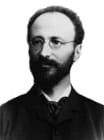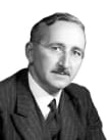Eugen Ritter von Boehm-Bawerk (1851-1914)

…a science of economics which fails to develop the theory of subjective value is building its house on a foundation of sand.
E. v. Boehm-Bawerk was a leading member of the 2ndgeneration of the Austrian School of Economics. His writings on what has become known as the Austrian Theory of Capital and Interest, and his equally insightful formulation of the Austrian Theory of Value and Price are considered pathbreaking. His trilogy Capital and Interest, Vol. I: History and Critique of Interest Theories (1884), Vol. II: Positive Theory of Capital (1889), and Vol. III, Further Essays on Capital and Interest (1914, posthumously) have served as the foundation stones for much of advanced economics. In his works he developed for the first time an intertemporal theory of value, on the basis of which he made significant contributions to modern capital- and interest theory. The theory of distribution based on this also provided the most devastating refutation of Marxist economic thinking to date. Boehm-Bawerk radically reformed the direct tax systems of the Austro-Hungarian Empire and was appointed KuK Minister of Finance three times: 1895, 1897 and 1900. In 1911 he was elected President of the KuK Imperial Academy of Sciences.
I
Eugen von Boehm-Bawerk was born on February 21, 1851 into a prominent family in Brünn (Brno), then part of the Austro-Hungarian Empire. He attended school in Vienna and already showed his outstanding talents in the exclusive Schottengymnasium by alternately claiming first place in academic performance with his friend, fellow Austrian scholar and later brother-in-law, Friedrich v. Wieser. From their class emerged a remarkably large number of important public figures and scientists.
Between 1868 and 1872 Boehm-Bawerk completed his studies of law at the University of Vienna and entered the KuK Financial Administration Service and the Ministry of Finance as an intern. Awarded with a state travel grant, he and his friend and later brother-in-law Friedrich von Wieser used the time from 1875 to 1877 to do more detailed economic research at the universities of Heidelberg, Leipzig and Jena (with profs. K. Knies, W. Roscher and B. Hildebrand respectively). However, it was neither one of them who stimulated or left any intellectual mark on Boehm-Bawerk’s and Wieser’s thinking. To the opposite, it was Carl Menger, who was just beginning to gain recognition as a young professor at the University of Vienna after having published his seminal book ‘Principles of Economics’.
Entirely in the spirit of Menger and building on his theories, Boehm-Bawerk wrote his first major work, “Rechte und Verhaeltnisse vom Standpunkt der volkswirtschaftlichen Gueterlehre“ (1881), which was the basis for his professorship at the Faculty of Law and Political Science in Vienna. Aside from Menger’s own writings, this brochure was the first publication in the new tradition of the “Austrian School”. Friedrich v. Wieser only followed in 1884 with his book Über den Ursprung und die Hauptgesetze des wirthschaftlichen Wertes. Wieser was F.A. von Hayek’s last and most influential teacher at the University of Vienna.
II
Soon after his appointment in Vienna, Boehm-Bawerk had the good fortune to be entrusted with the Chair for Political Economics at the University of Innsbruck, which had been vacated due to Th. von Inama-Sternegg’s sudden departure in 1881. While Boehm-Bawerk was teaching in Innsbruck, his two volumes of Capital and Interest where published and almost immediately translated into several languages. The third volume appeared posthumously in 1914. This trilogy must be considered his magnum opus and became a classic in capital theory. The first volume contains the history and his careful criticism of most existing theories of capital and was received with great acclaim. However, his Positive Theory of Capital (1889) regretfully did not find universal acceptance mostly due to the hostile rejection by Gustav von Schmoller’s ‘Younger German Historical School and the ongoing ‘Methodenstreit’. A series of larger and smaller treatises followed shortly thereafter. In his The Ultimate Standard of Value (1894) he covers the nature and origin of value, the measurement of value, the value of complementary goods, the scientific significance of subjective value and the theory of objective exchange value. Boehm-Bawerk expands Carl Menger’s theory of value in the sense of the so-called marginal utility theory and showed how individuals come to evaluate and weigh alternatives among which they may choose. He showed also the process that leads to decisions to select certain preferred combinations guided by the marginal utility principle. By using the same insights he completely demolished the Labor Theory of Value and any value theory that rests on claims of aggregate economic value or social worth. In this work Boehm-Bawerk succeeded in clarifying points that Menger himself hadn’t entirely spelled out, he also outlines for the first time the modern marginal productivity theory of factor pricing.
It is worth mentioning here that during his tenure in Innsbruck, Boehm-Bawerk was not only an avid mountaineer and an admirer of the Alps. Together with his close friend Franz von Juraschek he made several first ascents to some of Tyrol’s highest mountain peaks. Franz von Juraschek (1849-1910) taught Austrian constitutional law and statistics at the University of Innsbruck and was Friedrich A. von Hayek’s much loved maternal grandfather.
III
After about 10 years in Innsbruck, Boehm-Bawerk returned to Vienna and was appointed Ministerialrat in the KuK Ministry of Finance where he was entrusted with the grueling task of reforming direct taxes and creating a modern tax system for the Habsburg Empire. With the help of a few very able students of Carl Menger, among them in particular Robert Meyer should be mentioned here, Boehm-Bawerk solved this difficult task admirably and presented his draft in countless sessions of the tax committee. He also testified several times before the entire Imperial Council (Reichsrat), consisting between 425 und 516 members and speaking some 11 different languages. Although some details of the draft were changed during the lengthy parliamentary process, the general guidelines drawn up by him were included in the Personnel Tax Act of October 26, 1896.
In 1895 Eugen von Böhm-Bawerk was appointed KuK Minister of Finance by Prime Minister Erich Graf von Kielmannsegg and for a second time in 1897 by Prime Minister Paul Gautsch Freiherr von Frankenthurn. From 1900 to 1904 he held the same position for a third time under Prime Minister Ernest von Körber. During his tenure he conducted any number of important and difficult state financial transactions. Among the most profound and challenging tasks were the raising of funds for the military, for railway and waterway construction projects, the conversion of the common State Pension System, the 1903 settlement with Hungary and the famous Brussels Sugar Convention. As a politician he developed great versatility and handled the manifold responsibilities with great skill and success. His eloquent, clear, factual and impartial statements won him the sympathy in the entire Reichstag and his financial exposés were described as exemplary.
At the end of his tenure as KuK Minister he returned to a full-time professorship at the University of Vienna and taught there from 1905 until his death in 1914. His introductory course in economics as well as his several classes on Investigations into Political Economy proved very successful and students from the Empire flocked to his classes. However, Boehm-Bawerk’s advanced seminar on Topics on Themes in Economic Theory soon attracted some of the keenest minds of the time and thus became even more famous. This seminar was not only attended by his able disciples such as Joseph A. Schumpeter, Ludwig von Mises or Richard von Strigl to mention but a few. Also socialists such as Otto Bauer, Rudolf Hilferding or even the Bolshevik Nikolai Bukharin were among the participants who tried, without much success, to respond to Boehm-Bawerk’s devastating arguments against Marxism. As a scholar and teacher, Boehm-Bawerk was honest, just as he was as a person, and it was precisely because of this that he was also convincing as a politician. In 1911 he was elected President of the Imperial Academy of Sciences.
On Aug. 27, 1914, only about a month after WWI embroiled most of the nations of Europe, the United States and the Ottoman Empire in a senseless slaughter, Eugen Ritter von Boehm-Bawerk untimely died in the little village of Kramsach, near Innsbruck. Being intimately aware of the precarious condition of the Empire, shortly before his death, he published his last important article as “Macht oder oekonomisches Gesetz?“. This essay deals mainly with the question of whether economic events take place according to immutable economic laws or under the purposeful influence of social power factors. As if this text was penned today, it explains that powerful interest groups in society, most especially trade unions, suffer from a false conception that through their threat of force, they are able to raise wages permanently above the market’s estimate of the value of various types of labor. Arbitrarily setting wages and prices higher than what employers and buyers think labor and goods are worth merely prices some labor and goods out of the market.
Kurt R. Leube





































